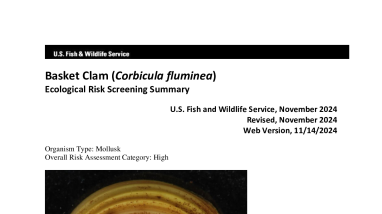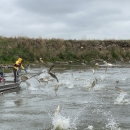Species that are considered high risk have a well-documented history of invasiveness in at least one location globally, and a high or medium climate match to the contiguous United States.
Corbicula fluminea, Basket Clam, is a mollusk that is native to southern and eastern Asia. The species can inhabit ponds, lakes, and rivers of all sizes with variable flows and sediment composition. C. fluminea can tolerate a wide range of temperatures and salinities. Aside from passive natural downstream transport, the main transport vector of this species is considered to be human activity, including global trade, fishing bait, human food source, ballast water discharges, aquarium releases, and recreational activities. Corbicula fluminea causes significant biofouling damage to water intake pipes, may carry parasites harmful to human, and impacts ecological systems in invaded areas. The species has high reproductive potential as it is a functional hermaphrodite, can reproduce by self-fertilization, and is capable of androgenesis. The History of Invasiveness for C. fluminea is classified as High due to its history of nonnative establishment and the documentation of numerous negative impacts from nonnative establishment. The climate matching analysis for the contiguous United States indicates establishment concern for this species. The climate match was high across the contiguous United States. The Certainty of Assessment for this ERSS is classified as High due to complete and scientifically defensible information available on the species distribution, history of introductions, and nature of impacts in the nonnative range. The Overall Risk Assessment Category for Corbicula fluminea in the contiguous United States is High.



